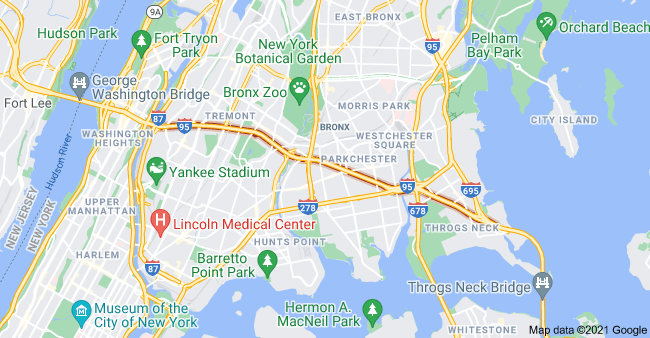NYC receives millions from the Feds to study capping of the Cross-Bronx Expressway
 Heavy pollution causing asthma to the population, deadly car accidents, no consideration for pedestrians and cyclists and racially biased, the Cross Bronx Expressway is in serious need of a revamp.
Heavy pollution causing asthma to the population, deadly car accidents, no consideration for pedestrians and cyclists and racially biased, the Cross Bronx Expressway is in serious need of a revamp.
Activists who have have been asking for years for the 8-mile highway to be capped have finally been heard. This week, as part of the infrastructure bill, Transportation Secretary Pete Buttiegieg announced that $2 million will be invested in a study looking at the negative impacts of the Cross Bronx Expressway by capping it and building parks, investing in electrical vehicle chargers and creating safer options for cyclists and pedestrians.
Originally built and designed by Robert Moses, the Cross Bronx Expressway has not only displaced populations of Black and Latinos and destroyed their businesses but has also became a major health issue for those families of the South Bronx who live nearby.
Almost 20 years ago, a study demonstrates that children from the South Bronx were breathing dangerous amounts of fine particle pollution from soot from diesel exhaust and as a result the rate of children suffering asthma in this area was the highest in New York City.
A more recent case study from by Columbia University Mailman School of Public Health in 2018 looked at the cost effectiveness of capping the Cross-Bronx Expressway and turning it into a park. They found that such a project would provide multiple health benefits. When green spaces are taking over highways, residents can exercise and enjoy nature. Additionally it becomes easier to walk, bike or use other clean ways of transportation. The air becomes cleaner and parks have the potential to reduce various diseases such as asthma, cancer, diabetes, heart diseases as well as mental illnesses.
These projects are feasible but the cost is high. The study estimates the cost of capping the Cross Bronx Expressway at around $760 million.
Map: courtesy of Google
 New York Personal Injury Attorneys Blog
New York Personal Injury Attorneys Blog


